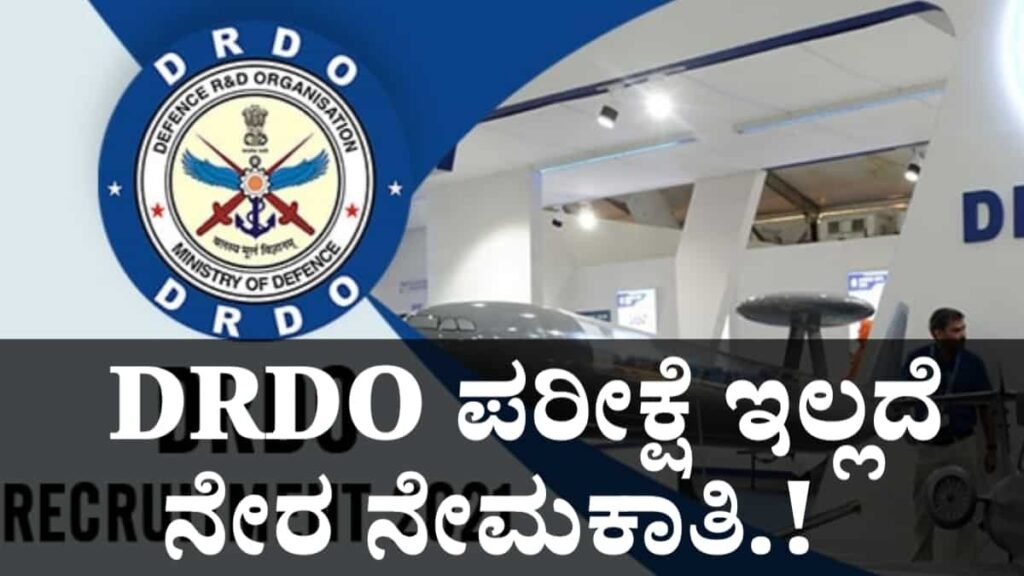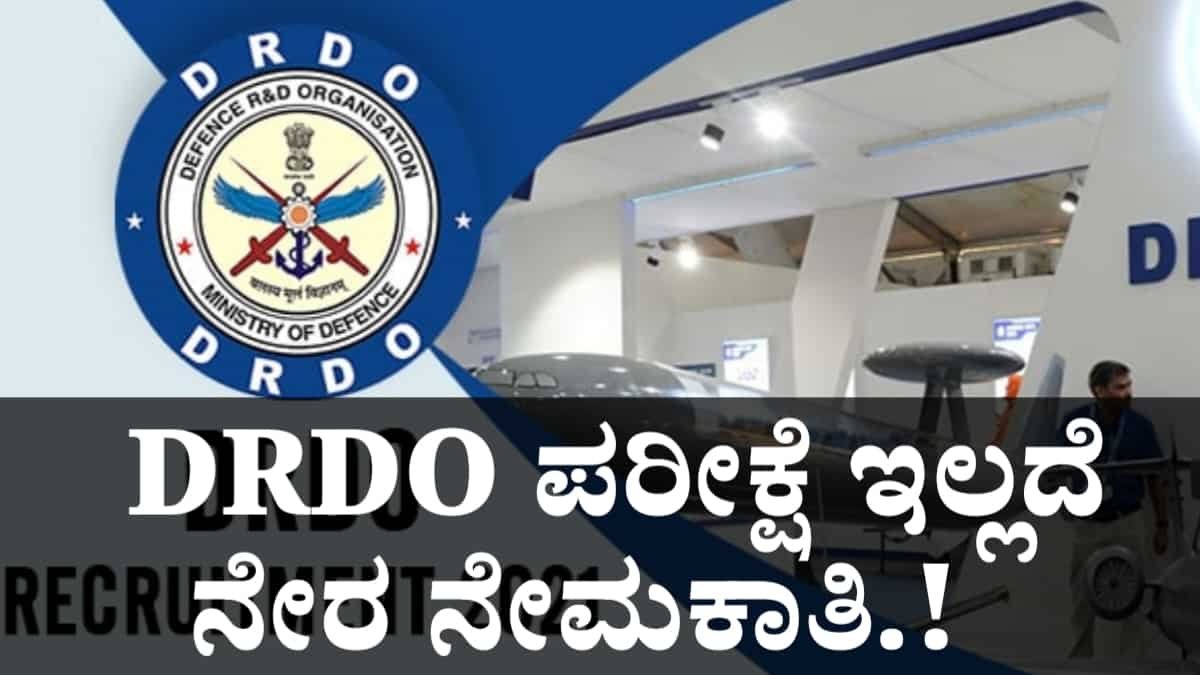Recruitment Details
The Defence Research and Development Organisation (DRDO) is one of India’s premier research bodies under the Ministry of Defence. Known for cutting-edge scientific work, especially in defence tech, DRDO offers ambitious scientists a chance to contribute to national projects and grow their research skills. For 2025, DRDO through its Aerial Delivery Research & Development Establishment (ADRDE), Agra, is inviting applications for Junior Research Fellows (JRFs).
As a JRF, your role involves assisting in defence-related research — this may include experimental work, analysis, designing small projects or components, testing, reporting, and collaborating with senior researchers. You’re expected to bring technical skills in your discipline, a curious mind, reliability, and willingness to take on responsibilities like data collection, literature review, lab work or field trials, depending on the project. The job isn’t just about following instructions; you’ll be encouraged to think, suggest improvements, perhaps publish or present work under supervision.
Vacancy Details
There are several vacancies for different engineering and technical disciplines under this ADRDE JRF recruitment. For example:
- Mechanical Engineering: 2 fellowships
- Aerospace Engineering: 1 fellowship
- Electronics Engineering: 1 fellowship
- Textile Engineering: 1 fellowship
Total number of slots is modest, meaning competition will be quite strong, especially for branches like Mechanical and Electronics, which often attract more applicants. Those disciplines tend to be more in demand because many applicants have those backgrounds. If your chosen discipline has only one or two seats, your application must stand out (better grades, projects, or clear motivation help).
Application Process
Getting your application right can really make a difference. Here’s how you apply and some tips to avoid slip-ups:
- First, ensure you meet the eligibility (educational qualifications, age, etc.).
- Prepare all required documents: mark sheets, degree certificates (or provisional if final degree is not yet awarded), proof of NET/GATE qualification if needed, caste certificate (if applicable), identity proof, etc.
- Fill out the application form carefully (in the prescribed format). Affix a recent passport-size photograph where needed. Be neat.
- Put all self-attested copies of documents along with originals (for verification) in the application envelope.
- The filled-form packet must reach the ADRDE, Agra office by the closing date. Make sure the envelope is labelled properly (mentioning Fellowship name, Subject Code, Discipline).
- If you’re working in a government agency/PSU/autonomous body, apply through proper channel and arrange for a No Objection Certificate (NOC) if required.
Tips to avoid mistakes:
- Don’t wait till the last minute — postal delays happen.
- Use clear, legible writing if the form is handwritten.
- Double-check your passport photo, name spellings, and that you have signed where needed.
- Make sure you have a valid NET/GATE certificate (if eligibility demands it), not expired.
- Keep copies of everything you send.
Job Location
The work will be based at ADRDE, Agra (Uttar Pradesh), a DRDO laboratory focused on aerial delivery research and development.
Expect a laboratory or R&D facility environment. Depending on the project, you may have to visit field sites, workshops, or test areas. Occasionally, travel may be required for testing or collaboration with other labs. Relocation is not broadly expected beyond moving to Agra, but being open to lab-site travel or small regional transfers (if the project demands) helps.
Living costs in Agra are moderate compared to metro cities; though commute, housing, and local amenities may differ from big-city norms. If you don’t already live nearby, plan for accommodation, commuting times, and cost of moving.
Salary & Pay Scale
As a Junior Research Fellow under this DRDO ADRDE recruitment, the stipend is ₹37,000 per month, plus House Rent Allowance (HRA) and medical facilities in accordance with DRDO / Government of India norms.
This is quite competitive for entry-level research positions in government R&D. Over the duration, your financial security is decent, and grants or research facilities may also help offset other costs. For those planning long term, performing well in the fellowship can open doors to further roles (SRF, technician-scientist, or permanent researcher) with higher pay and added responsibilities.
Age Limit

You need to pay attention to age requirements, as these are strictly enforced:
- Upper age limit: 28 years as on the closing date for application.
- There is relaxation in this upper age limit for reserved categories: SC, ST, OBC, in line with Government of India rules.
If you are just over the limit, check whether there’s proof needed (birth certificate, school leaving certificate) to verify your date of birth. If you are near the age cut-off, make sure you don’t miss deadlines (sometimes delays happen in submitting forms, so buffer time helps).
Important Dates
Applications are being accepted up to 25 September 2025; that is the last date to submit your filled-application package to ADRDE. Before that, make sure you’ve compiled all documents, done your verification, and sent them in with enough time for postal transit.
After that, DRDO will conduct screening or shortlisting, then interviews. Exact interview dates will be communicated later through the official notification via DRDO channels. So stay alert after application submission. Also, remember that calculation of your age, educational results, qualification norms all use the “closing date” as reference — anything must be in order by that date.
Educational Qualification & Experience
To be eligible for the JRF fellowship, here’s what’s needed:
- Academic degrees:
- A Bachelor’s degree (BE/B.Tech) in the relevant engineering discipline (Mechanical / Aerospace / Electronics / Textile) with first division (or equivalent grade).
- Or a Master’s degree (M.E./M.Tech) in that discipline, again with first division/class at both bachelor’s and master’s level.
- Competitive exams: A valid GATE or NET certificate is required in some cases or as per the advertisement, especially for disciplines with higher competition.
- Experience: Usually, no professional R&D work experience is required, though having project work, internships, or lab experience will strengthen your application.
Tips if slightly underqualified:
- If you don’t have a Master’s degree but have done strong projects or publications, highlight them.
- If your grades are slightly below first division, but you have performed well in GATE or similar exams, that can help.
- Additional certifications, workshops, or online courses in your field can add value.
- Strong statement of purpose or project summaries help show your interest and capability.
Application Fee
For this particular JRF recruitment at ADRDE:
- There is no application fee mentioned for this DRDO ADRDE 2025 advertisement. (This is a benefit, especially for general category candidates).
Even when there is a fee in some DRDO or allied recruitments, the modes usually include demand drafts, postal orders, or online payments. Always use secure, traceable payment methods. If a fee exists and you belong to SC/ST/OBC, check if there is a waiver or reduced fee option.
Selection Process
Here’s how the selection works, along with how you can prepare:
- Screening: Applications will be screened first — verifying eligibility (educational qualifications, age, correct documents, GATE/NET status). Only those meeting criteria move ahead.
- Interview: Shortlisted candidates are called for interview at ADRDE, Agra. The interview may test your subject knowledge, problem solving, understanding of fundamentals in your discipline, research aptitude, and sometimes general awareness of DRDO’s projects.
It appears there is no written exam in this ADRDE JRF recruitment; selection is via screening + interview.
Preparation tips:
- Review your core subjects thoroughly (mechanics, electronics, signals, materials, etc., depending on the discipline).
- Brush up on GATE or NET syllabi in your subject; even if you don’t have perfect rank, studying that material helps in interviews.
- Be familiar with research methods, recent developments in your field, maybe one or two papers you read.
- Practice past interview questions: explaining projects, what you did, what you would do differently, etc.
- Be confident, clear in communication, neat in documentation.
📌 Important Links
Age Calculator
Salary after tax calculator
| Description | Link |
| Notification PDF | Click Here |
| Official Website | Click Here |
| Join WhatsApp Channel | Click Here |
| Join Telegram Channel | Click Here |
FAQs
Here are answers to common questions aspirants often ask, explained simply:
1. Can final-year students apply?
Only if you have completed your degree (or you will obtain/provide a provisional certificate) OR if the advertisement explicitly allows applications from those awaiting results. For ADRDE 2025, those with degree / provisional certificate are eligible.
2. Is NET/GATE compulsory?
Yes, in most disciplines for this ad, NET or GATE qualification is required. It helps in shortlisting and sometimes in proving eligibility.
3. What if I belong to SC/ST/OBC? What relaxations do I get?
You get age relaxation (years added to upper age limit as per government norms), and sometimes reservation of seats. Always attach a valid certificate.
4. How is first division / first class evaluated?
Universities differ, but usually you must have secured marks or grade equivalent to first division/class in your Bachelor’s (and Masters if applicable). When in doubt, compute percentage / check your university grade rules.
5. What is the stipend amount? Are there additional benefits?
₹37,000/month stipend for JRF, plus HRA (house rent allowance), medical benefits. Other benefits depend on DRDO norms (e.g., leave, travel for official duties).
6. Is there any guarantee of absorption (i.e. job after fellowship)?
No. Fellowship is for a fixed period (two years in this ADRDE case). It does not confer right of absorption into DRDO regular staff. But good performance may improve future opportunities.
7. Can I work from home or remotely?
Mostly, research work for DRDO is lab-based or on-site, so remote work isn’t typical. Some theoretical or simulation parts might allow flexibility, but expect to be physically present at the lab.
8. What are the chances of extension beyond initial period?
Extensions depend on project need, performance, availability of funds. But don’t assume you’ll get an extension; plan as if for 2 years.
9. How will I be informed about interview dates or result?
DRDO publishes notifications through its official career portal and via advertisement documents. Keep checking the DRDO careers page; check your email regularly (if asked to give).
10. If my marks are slightly lower or I don’t have strong project experience, should I still apply?
Absolutely—if you satisfy basic eligibility, you should apply. Emphasize what you do have: good academic foundations, any project/work, motivation, clarity of your goals. Sometimes enthusiasm and clarity make a difference in interview.
Final Thoughts
If you aim to be a Junior Research Fellow with DRDO, think of this as more than a job—it’s a stepping stone into serious research. Make your application clean, double-check every document, show you are prepared and eager. With strong fundamentals and the right preparation, many applicants find success even if they don’t have perfect profiles.
Wishing you the best of luck—may your research journey be fulfilling, challenging, and full of discovery!
